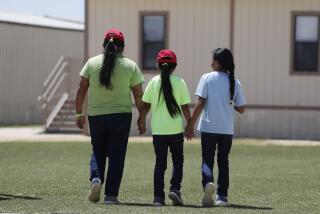U.S. Won’t Pay Groups That Aided Aliens
- Share via
WASHINGTON — The federal government will not reimburse community organizations nationwide for millions of dollars they have spent to provide health and education services to newly legal aliens, federal officials said Thursday.
Groups notified of the decision protested that unless they receive the money--which totals $13 million in California alone--some may have to go out of operation, jeopardizing implementation of the 1986 immigration law.
At issue is the interpretation of a provision in the law that provides for government reimbursement for services that helped illegal aliens qualify for legal status in this country or for new benefits they received as a result of obtaining legal status.
States, which will receive federal grants totaling $4 billion over a four-year period to cover such expenses, have sought to reimburse the private organizations retroactively for the services provided between Oct. 1, 1987, and June 30, 1988.
But officials administering the State Legalization Impact Assistance Grants at the Department of Health and Human Services have said that no payments will be made for expenses incurred before this summer, when formal contracts were signed with the private groups for their work.
Those services range from providing English and U.S. history tutoring to aliens seeking permanent residency to outpatient health care for aliens who now qualify for it because they have obtained legal status.
Charges of Unfairness
The rejection, detailed in notices made to some of the groups recently, has brought complaints from several dozen members of Congress and state officials who are trying to convince the federal government to release the funds. And it has brought renewed charges by immigrant rights activists that the federal government refuses to treat immigrants fairly.
The community organizations assert that they could not sign their contracts earlier than this summer because the federal government was slow to publish regulations on the program, carried out as part of the 1986 Immigration Reform and Control Act.
At the Department of Health and Human Services, Carol de los Reyes, a spokeswoman for Norman L. Thompson, who directs the federal grant program, confirmed that federal officials are blocking payments but declined to elaborate on the decision.
“We’ve had the concerns brought to our attention, and we’re looking into it,” she said. She said she did not know how the matter would be resolved, adding: “There are some real policy concerns here.”
Agencies in California, which will receive about half of the $4 billion in grant money over the four-year period, are hardest hit by the interpretation. The state had planned to reimburse health care providers $8.5 million for the disputed nine-month period, and it expected to pass out another $4.5 million to groups providing educational services.
Deprived of Help
State officials said that if some of the organizations cease or cut back their operations, California will be deprived of valuable help in its effort to serve a population that has traditionally distrusted government.
“The private groups have been the most aggressive in the legalization process,” said Richard Stiles, who administers the grant program for the California Department of Education. “They are the ones who have rapport with the people who have been hiding out” because they were illegal.
People who were granted temporary legal resident status under the amnesty program are required to demonstrate knowledge of English and the U.S. government before they are granted permanent residency--the second step in the amnesty program. Both public and private officials said that if the private groups discontinue their classes, the public-run classes will be strained beyond capacity.
In refusing to allow the reimbursements, the federal government is “willfully and knowingly sabotaging the program,” charged Arnoldo Torres, director of public policy for the League of United Latin American Citizens.
“We dutifully read the regulations and redoubled our efforts” to get immigrants to apply, said Bert Corona, director of La Hermandad Nacional in Los Angeles, which provides health and education services to immigrants. “Now they are saying we won’t get paid. This is ridiculous.”
‘Wind Up With Lawsuit’
In Sacramento, Raul Meyreles, executive director of La Cooperativa Campesina de California, said that his organization would lose $200,000 spent on education unless the government allows reimbursements for the period. “If they don’t agree to go back to October, we will wind up with a lawsuit,” he said.
A letter written by Clifford Allenby, secretary of the California Health and Welfare Agency, and one signed by Sen. Alan Cranston and 23 California congressmen urge the Department of Health and Human Services to reverse its position. In addition, Dennis Eckhart, deputy attorney general for California, said after reviewing the matter that he found no legal prohibition against the reimbursements.
More to Read
Sign up for Essential California
The most important California stories and recommendations in your inbox every morning.
You may occasionally receive promotional content from the Los Angeles Times.










